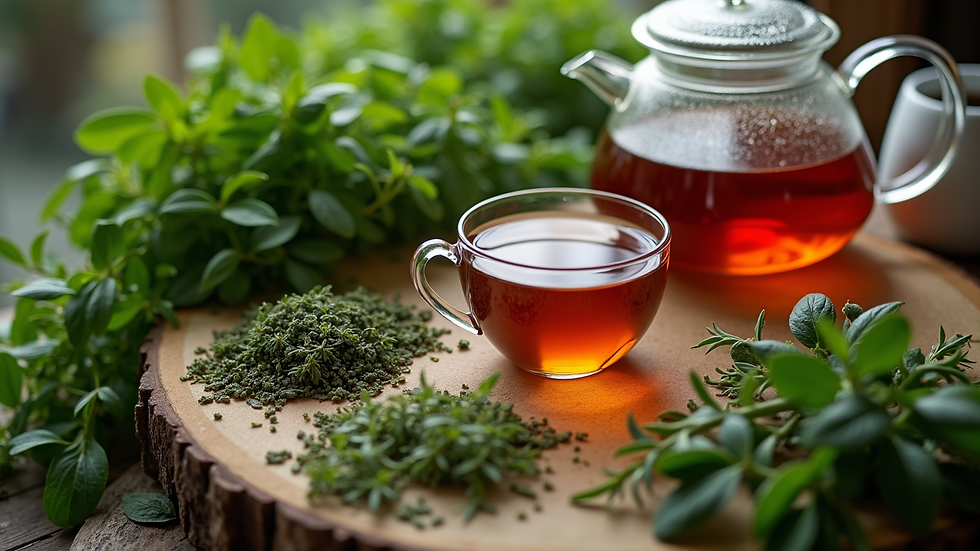Understanding Organic Medicinal Herbs for Wellness
- superiorpro
- Oct 14, 2025
- 3 min read
In recent years, there has been a growing interest in natural health solutions. Many people are turning to organic herbal remedies to support their wellness. These remedies, derived from plants grown without synthetic chemicals, offer a gentle and effective way to maintain health. This article explores the benefits, uses, and practical tips for incorporating organic herbal remedies into your daily routine.
What Are Organic Herbal Remedies?
Organic herbal remedies are treatments made from plants cultivated without pesticides, synthetic fertilizers, or genetically modified organisms. These remedies harness the natural healing properties of herbs to promote physical and mental well-being. Unlike conventional medicines, organic herbal remedies often work holistically, supporting the body's natural balance.
Some common examples include:
Chamomile for relaxation and sleep support
Echinacea to boost the immune system
Turmeric for its anti-inflammatory effects
Peppermint to aid digestion
Choosing organic ensures that the herbs are free from harmful chemicals, making them safer and often more potent.

Benefits of Using Organic Herbal Remedies
Using organic herbal remedies offers several advantages:
Purity and Safety
Organic herbs are grown without synthetic pesticides or fertilizers, reducing the risk of chemical residues. This purity is especially important for those with sensitive systems or allergies.
Environmental Sustainability
Organic farming practices promote soil health, conserve water, and reduce pollution. Supporting organic herbal remedies means supporting eco-friendly agriculture.
Rich in Nutrients and Active Compounds
Studies suggest that organic plants may contain higher levels of antioxidants and beneficial phytochemicals compared to conventionally grown counterparts.
Holistic Health Support
Herbal remedies often address multiple aspects of health simultaneously, such as calming the nervous system while reducing inflammation.
Fewer Side Effects
When used correctly, organic herbal remedies tend to have fewer side effects than synthetic drugs.
To maximize benefits, it is important to source herbs from reputable suppliers who adhere to organic standards. For more information on trusted sources, visit organic medicinal herbs.

How to Incorporate Organic Herbal Remedies into Your Wellness Routine
Integrating organic herbal remedies into your daily life can be simple and rewarding. Here are practical ways to get started:
1. Herbal Teas and Infusions
One of the easiest methods is drinking herbal teas. For example, chamomile tea can help you unwind before bed, while ginger tea supports digestion.
2. Tinctures and Extracts
These concentrated liquid forms allow for precise dosing. They can be added to water or juice and are convenient for on-the-go use.
3. Topical Applications
Herbal oils, salves, and creams can be applied directly to the skin to soothe irritation, reduce inflammation, or promote healing.
4. Cooking with Herbs
Incorporate fresh or dried herbs like basil, rosemary, and turmeric into your meals to enjoy their health benefits naturally.
5. Aromatherapy
Essential oils derived from organic herbs can be used in diffusers or baths to enhance mood and relaxation.
Tips for Safe Use
Always consult with a healthcare professional before starting any new herbal regimen, especially if you are pregnant, nursing, or taking medications.
Start with small doses to monitor your body's response.
Purchase herbs from certified organic sources to ensure quality.

Understanding the Science Behind Herbal Healing
Herbs contain a variety of bioactive compounds such as alkaloids, flavonoids, and terpenes. These substances interact with the body in complex ways to support health. For example:
Anti-inflammatory properties: Turmeric contains curcumin, which helps reduce inflammation linked to chronic diseases.
Antioxidant effects: Green tea is rich in catechins that protect cells from oxidative damage.
Immune modulation: Echinacea stimulates immune cells to fight infections more effectively.
Research continues to uncover how these compounds work synergistically. While herbal remedies are not a substitute for medical treatment, they can complement conventional care and promote overall wellness.
Tips for Growing Your Own Organic Medicinal Herbs
Growing your own herbs is a rewarding way to ensure freshness and quality. Here are some tips:
Choose the right location: Most herbs need plenty of sunlight and well-drained soil.
Start with easy-to-grow herbs: Basil, mint, and parsley are great for beginners.
Use organic soil and compost: Avoid chemical fertilizers to keep your garden truly organic.
Water appropriately: Overwatering can harm herbs; keep soil moist but not soggy.
Harvest regularly: This encourages new growth and keeps plants healthy.
By cultivating your own herbs, you gain direct access to fresh, potent ingredients for your remedies.
Embracing a Natural Path to Wellness
Incorporating organic herbal remedies into your lifestyle can enhance your health naturally and sustainably. Whether through teas, tinctures, or homegrown plants, these remedies offer a gentle way to support your body’s needs. Remember to source your herbs responsibly and consult professionals when needed. Embrace the power of nature and discover the benefits of organic herbal remedies for your wellness journey.









Comments